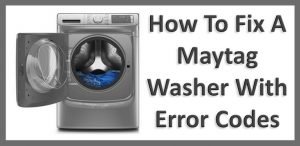
Let’s break it down. In simple terms, Error E2 means your washing machine is having trouble draining water properly. Think of it like a clogged sink; if water can’t escape, you’ll end up with a mess. Ignoring this error is like choosing to live with a perpetually clogged drain, and no one wants that! Not only could it mean clothes that are still sopping wet at the end of a cycle, but it can also lead to bigger issues down the line.
Understanding the Maytag Error E2
Error E2 in Maytag washing machines is somewhat akin to a red flag or a warning light in a car. It’s a signal indicating a problem with the drainage system – specifically, it’s saying that the machine isn’t draining water as it should. This could result from a few different issues, such as a blocked drainage hose, a faulty drain pump, or even an obstruction in the machine itself.
Imagine trying to sip a thick milkshake through a straw that’s pinched. It takes a lot more effort, right? If your washing machine’s drainage system is blocked, it must work harder to move water out, which could strain the machine. Over time, this extra effort might wear down components quicker than usual, just like your frustrated attempts with that milkshake straw!
When Error E2 appears, it’s tempting to ignore it and hope it’ll magically fix itself. Unfortunately, unlike a stubbed toe, appliance issues rarely resolve without intervention. The longer you let this problem simmer, the more likely it is to boil over into something worse – potentially damaging your washing machine further and leading to costlier repairs.
Why It’s Important to Address Error E2 Promptly
Leaving Error E2 unresolved is like ignoring a leaky roof. Sure, you might get by for a while, but eventually, that drip-drip-drip is going to ruin more than just your ceiling paint. The immediate consequence of not fixing the error is inefficient washing cycles, which means your clothes may not end up as clean as they should be. Also, they might still be wet, leaving you to struggle with laundry that isn’t fully wrung out.
Here’s the rub: the longer you wait, the more serious the damage can become. If the issue is with the drain pump, which plays a crucial role in expelling water from the machine, ignoring it could lead to a complete pump failure. Replacing a pump is more costly and time-consuming than clearing a simple blockage.
What’s more, this error could eventually lead to water leaks. Picture a pot boiling over because the lid is on too tight and you don’t intervene – that’s your washing machine if it can’t drain properly. Leaks aren’t just inconvenient; they can cause floor damage or even lead to mold growth if water seeps into unwanted areas. If you notice Error E2, don’t wait to act. Addressing the problem quickly can save you from these headaches.
Steps to Fix Error E2
So, how do you tackle this error like a pro without having a degree in appliance repair? First, take a look at the drainage hose. This is the first suspect in our line-up. Ensure it’s not kinked or blocked. Much like unkinking a garden hose, fixing this could be as simple as a little adjustment.
Next, check the drain pump filter. Is it clogged with lint, coins, or other debris? Imagine your mouth was stuffed with marshmallows while trying to talk – it’s very much like that for a blocked filter. Clearing it can significantly improve water flow.
If these steps don’t resolve the issue, the drain pump itself may be the culprit. Here you might need to call in a professional. Think of it like seeking a doctor for a persistent cough – sometimes self-medication only goes so far. Professionals can diagnose deeper issues and ensure your machine is running smoothly again.
Preventing Future Errors
Wouldn’t it be great if you could prevent Error E2 entirely? While no machine is immune to issues, regular maintenance can greatly reduce your chances of running into this problem. Start by regularly checking and cleaning the drain hose and pump filter, much like you’d clear hair from a shower drain to prevent clogs.
Also, be mindful of what you’re washing. Items with loose coins, heavy dirt, or lots of fibers can contribute to blockages more quickly. Finally, running a regular cleaning cycle – think of it like flossing for your washing machine – helps keep everything in good working order.
By keeping an eye out for potential issues and addressing them early, you can keep your washing machine humming happily along. And let’s face it, a happy washing machine means less stress for you, and isn’t that what everyone wants?